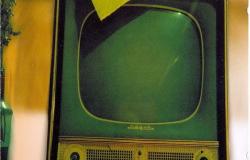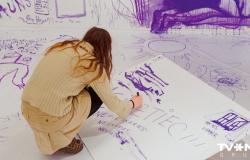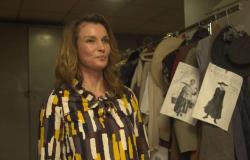Henrietta Verhoustynska: The first audiences have already appreciated both the reconstructed theater and your first premiere “Sect of Dream Translators”. Does it feel like a second wind has opened up? Is it a bit more like a bit of a cautious feeling of what will happen?
Gundars Aboliņš: Both, both. There is always this feeling, because without this feeling you can’t really start the show, because you can never guarantee that the show will end exactly like that. The audience is different, and many circumstances work for the fact that every night the show is different. That’s one. The second is that the second breath has to come just before the second act or we won’t get to the end.
The play “Sect of Dream Translators” in the New Riga Theater
Photo: Jānis Deinats
Your new show is based on Milorad Pavic’s magical realism work “The Dictionary of the Khazars”. For those viewers who don’t know anything about it yet, how would you say what this story is about and why did you choose this particular story as the opening act in the new home? Should I say – in the new old houses?
In the new home in the old place, I would say. The choice of this material is up to our artistic director Alvjas Hermanis, and I think he would be the best to answer it, why this one. He has already said that, first of all, it is, as you said, magical realism, in which we actually live today. Many things we cannot explain and we often use the word – dreamy. What is the real reality? There are many scientific theories about it, but we were more interested in the mystical artistic, shamanic side of the whole story, what dreams are and what they are, and what the traditions once were.
There is quite a big mix, I don’t even know enough about history to be able to put it together like that, but the magical thing.. Because we are basically translators. You mentioned my other profession – translator, well, it’s my hobby, let’s say it’s not my profession. It is a very serious profession in itself, I do it as a hobby. But the actor is basically also a translator. He translates the ideas of the playwright, the director into the language of the stage, passing through himself. In any case, it is an interpretation or a translation. Well, interpreting dreams is one of the actor’s jobs. How many good ideas have not been dreamed up…
This show is unusual in the New Riga Theater with the amount of movement in it. It is based to a great extent not only on narration, which of course you are very good at – storytelling, but also on movement, creating various pictorial scenes, such as bas-reliefs from your bodies. Is the show physically demanding?
Yes, of course, it is not easy. Since none of us are that special… Well, some of us have trained more, but others, as you can see, haven’t been in training for a long time, the rehearsal process lasted more than two months, and the muscles still remembered some skills. So, yes, it is not easy.
And connect narrative with movement? Does it require any other skills than usual?
A third point of support is needed there. It is talking, moving and most importantly – thinking. If you can combine it, then… The camera, which is also driving here, stands firmly on three legs.
New Riga Theater
Photo: Aija Kinca / Latvian Television
JRT has been a discoverer of a new language, a finder, an introducer of new pages of theater history, and now we have to look for something new again, find ourselves anew. This search, it should be the basis of your theatrical language, can you agree to that? And what kind of search do you expect?
It was a difficult question. I think that the years go by and there probably isn’t much left, and it’s still interesting to try something that you haven’t done before or haven’t done in a very long time. Alvis Hermanis already said that our way forward begins with the fact that we try to do what we have not done so far. Alvis had also studied the situation with the dance theater, with the contemporary dance theater, that it is of interest to a relatively small part of people.
But very faithful to this genre.
Well, yes, yes, all the shows have the same small part, and that’s it. We are now trying.. What are we doing? Are we trying to compete with contemporary dance groups, or are we creating theater with a lot of movement? I don’t know if there is even a line to draw, but in any case, we are taking a big risk, because movement theater, dance theater, contemporary dance is not the most popular. But we haven’t done that so far. Although in “Revident” we sweat even more.
Because you were dressed in fat coats.
Yes, and there was a lot of movement there, no one sat there in peace, but here the movement has a different approach and a different role, it is like a pulsation. It’s a rhythm, an all-time rhythm, such an energetic pulsation.
Do you feel like a ritual in this show?
Yes, there would be no point without it. You have to find a sense of participation in a ritual in any performance. If you don’t feel like a participant in a ritual or some secret, then… Well, that’s a pity.
Directors Gatis Šmits, Aiks Karapetjans, Kristīne Krūze, Inga Tropa, Marija Linarte have worked in your theater in recent years, but the public still perceives JRT as the theater of Alvjas Hermanis. Do you see that this should continue, or should some new directors enter the theater?
Well, you already mentioned new directors who have come in. It is part of the process, it has been for a long time. One is the leader and the captain. As well as a chef and a whole team of cooks working in the kitchen. One makes the desserts, one does this, one does that, but there is a chef who determines the style of the kitchen and the menu for the next day and the next week. That’s how it is. A single chef can no longer buy products, prepare food, wash dishes and serve.
I read with great interest the conversation in “Ir” magazine with Elita Kļaviņa and Vili Mľiņiņa, who revealed that your make-up shop is located in the legendary Smilģi’s office. Is that so?
Well, in part it is. For now, I still use it as a dressing room [citu telpu], the guys I was with before gave me one table, and now I’m in a dressing room in the traditional sense. Make-up generally happens [citur], we have a hair salon where our makeup artists work. But, yes, I really wanted to be in the place where Smilģa’s office was. It was also the office of Arnold Liniņš and the office of troupe leader Jānis Jurov, and during the time of the Youth Theater there was a Smilģas office as a memorial place, which was taken care of by Kārlis Anuševits, and when he left he wished me that there was someone who would stay and take care of me.
Because, you see, I am the only one of all the people working in the theater who has seen Smilģi. Well, once, and I was like this [rāda ar roku augstumu līdz ceļgalam], and it was Smilģas’s funeral. My mother took me with her to Smilģas’s funeral. But I have worked together with Lilita Berzisin, with Vija Artman, with Hari Liepin, with Valentina Skulmi, with many, as they say, his actors with his school. But it’s not… It’s not even about Smilģi. We are talking about a place where such historical evidence should come together.
I expressed such an initiative, and the theater willingly agreed to it. There’s only… There’s no light there, you can’t open the window there, there’s no water tap, there’s nothing there. There are four walls. But the Valentina Freiman library will be there. Her book collections, as space will allow. There will be many exhibits from those who are there. We will return many to the Theater Museum, because there is a more suitable place for them, but there are many things that have historically been there. It is both the Fine Arts Theater and the Youth Theater, as well as JRT before the reconstruction, and gradually JRT after the reconstruction. I’m just wondering how the times are there.. There won’t be any new furniture. Each thing has its own biography, each thing has been on stage and played its role.
But the audience will be able to get there and see?
No.
This is for internal theater use only?
It’s just for ourselves, yes. In the theater, the audience has a part of the audience, but it is important for us. Well, if someone really wants to, no one will stand in front of you with a gun, but it’s not meant for public inspection, it’s meant for you, so that you understand that there was something before you.
Theater doesn’t start with me. Theater has started and lived and been strong and interesting and diverse long before me. It is worth remembering.
I agree with you. You also take part in the next production of Alvias Hermanis, “Black Swan”, based on one of the motifs of Dostoyevsky’s novel “The Idiot”. What can you tell us about this upcoming show? Will there be a lot of movement?
There will be, yes. There will be ballet, just a little different. No, it will be like a ballet or, in fact, perhaps our paraphrase of the Russian classical ballet. Also on the poster of the show, which has already become public knowledge, there are four swans from “Swan Lake”, and Tchaikovsky’s ballets and “Swan Lake” are known to have a very multi-layered meaning in our lives.
It was usually played on the day of funerals for dead leaders.
No, no, there were five days of mourning, when nothing was shown but “Swan Lake,” “Nutcrackers,” or “Giselle.” I remember. I still remember those three ballets, and the symphony concerts were also broadcast. Anyway, it’s a very beautiful ballet in itself with very beautiful music, but it’s not about the music and Tchaikovsky. It is about the fact that it will be the style of the play that we come from the world of Russian classical ballet. The main thing there will not be the ballet, the main thing there will be, in a paradoxical way, Dostoevsky’s ideas, which he wrote. They are in writing, they have not been heard. His ideas resonate in a very strange way with the rhetoric that is heard today, and… It’s hard for me to say, I don’t want to reveal too much.
About the election of the Russian people, which is one of Dostoevsky’s motives?
I do not want [tajā iedziļināties], I won’t say it in two words, but Dostoyevsky wrote a lot of things that… A bad person can take a good idea and degrade it, and it has happened countless times. You take a good idea, beautiful words, noble intentions and degrade it all with your actions. Dostoevsky is not to blame, the one who took it and degraded it is to blame, but it must also be looked at with understanding.
I don’t know, it’s not going to be an easy show, and yes, the movement will be there. I will finally be able to come back on stage in white tights.

Gundars Āboliņš and Henrieta Verhoustinska
Photo: Aigars Bumburs / Latvian Television
Can not wait! I also wanted to talk about your occupation, which you described earlier as a hobby – translation. Does it help you as an actor, that you regularly exercise your brain by translating, transferring a text from one foreign language into our own?
Yes, very much. First and foremost, it trains your instrument – the sense of language. It enriches your language, it polishes your means of expression also purely from the grammatical aspect. It helps you keep, so to speak, many interesting synonyms, expressions in your working memory and find the key to them. At the moment, the stage speech on the stages of Latvian theaters is very… There are many opportunities for further improvement.
How delicate you are.
This is one way. The pianist exercises his fingers, I exercise my sense of language. I need it like some people need a morning cross, others need a cold morning shower, I need an hour and a half in the morning with letters. I also wake up differently. It requires you to concentrate, and every time you start from the beginning, in the morning. I’m not enough [iztulkoju], professional translators would have translated 10 books long ago, while I translated 100 pages. It’s going very slowly for me..
Because you have a lot of other things to do.
That too. Secondly, after some time I reread it and look – no, it doesn’t sound. Language has to sound. I have spoken with other translators, with Daci Meieris, and she says that I always read aloud what I have translated. I tried it – yes, if it sounds when you read it aloud, then it’s good. If you lose your train of thought while reading aloud or the words get stuck in your teeth, then something is wrong. Then you have to try another word or change the order of the words, and this is a very interesting activity. It is the maintenance of one’s mother tongue.
Tags: Interpreting dreams actors jobs Conversation JRT actor Gundars Abolinas Article
-







